How US Jewish Groups are Protecting Voting Access in 2020
Mobilizing legal teams to report voter suppression, educating voters and help people get signed up, the organizations say they are united in fighting minority disenfranchisement.
If you’re in Arizona or Florida and a 585 area code pops up on your phone, you might want to answer: It could be a Jewish volunteer in Rochester, New York, whose mission it is to help you vote.
The Greater Rochester Jewish Federation is one of a number of local and national Jewish organizations endeavoring to make sure eligible voters — Jewish and not — get to the polls.
“The goal is really to register disenfranchised voters, specifically minority communities where access to proper information on voting access, to voter education, all the stuff that you need to be informed, and really to vote in general is really at an all-time low,” said Sarah Walters, the federation’s community relations director.
The Jewish Council for Public Affairs, the umbrella body for public policy groups, has helped Jewish Community Relations Councils in eight states — Arizona, Florida, Georgia, Michigan, Nevada, Ohio, Pennsylvania and Wisconsin — partner with “All Voting is Local,” a voter registration project run by the Leadership Conference on Civil and Human Rights.
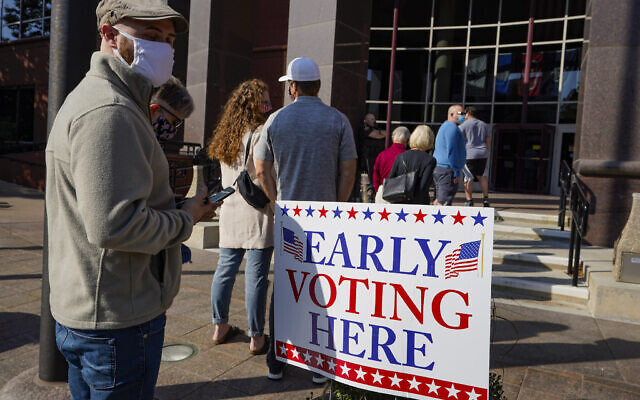
“We’re committed to the protection of people and the right to vote,” said Melanie Roth Gorelick, JCPA’s vice president. “But it’s a fine line to walk this year because of the extreme partisan nature of the landscape.”
Here are some of the protective measures Jewish groups are taking ahead of Election Day.
Registering de-registered voters
Republican-led states have in recent years removed from the rolls voters who have not voted for several successive elections. Democrats and voting rights activists say that because turnout is traditionally lower among minorities and people living in poverty, the action amounts to disenfranchisement.
The Rochester federation partnered with Reclaim the Vote, a project of Center for Common Ground, a voting rights group. (The Reform movement also has partnered with Reclaim the Vote.) Walters said that 150 Jewish volunteers in her city have trained so far to reach deregistered voters in Alabama, Arizona, Florida, Georgia, Mississippi, North Carolina, South Carolina, and Texas.
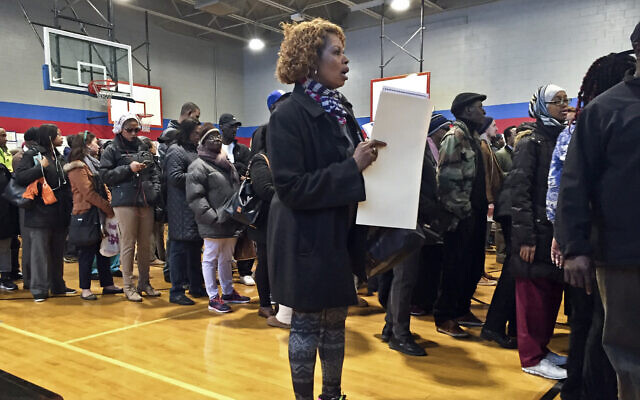
“You’ve got a script right in front of you that is county-specific and person-specific with all the information they need to figure out if they’re registered,” Walters said. “If they believe that they are registered — in many cases people have registered before but have been removed from voter rolls for not voting enough — you’re making sure that they know how to check that and if they aren’t registered, you’re making sure they have the resources they need to find out that they’re eligible to register.”
Mitigating suppression by increasing turnout
The Religious Action Center of Reform Judaism wants an “overwhelming” turnout, said its director, Rabbi Jonah Pesner.
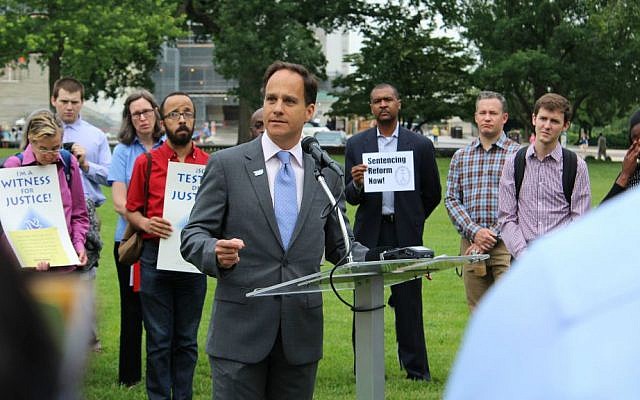
The pandemic means door-knocking is not the option it was in past elections, so Reform volunteers have used electronic means to reach voters, through texting and apps. “We had originally set as our goal 250,000 voter engagements,” Pesner said. “We’ve engaged 350,000 and we’re on track to get to half a million by Election Day.”
The outreach is strategic, Pesner said, citing as an example the RAC chapter in Chicago. Illinois, solidly Democratic, does not pose a disenfranchisement threat, so the local Reform Jewish activists consulted with longtime allies in Black churches. They joined efforts to reach voters in neighboring Wisconsin, which is a critical swing state, and where Republican legislators have sought to inhibit mail-in voting and have limited polling places.
“Knowing that there would be attacks on enfranchisement in the inner city of Milwaukee in particular, this kind of interesting intersectional effort was born between the relationships that pre-existed in Chicago,” he said.
Bringing out the lawyers
Pesner’s RAC is also recruiting lawyers to join a project run by the Lawyers Committee for Civil Rights Under Law to be on call until Election Day to report attempts at voter suppression.
“The hotline has already become almost overwhelmed with calls,” said Pesner. “And obviously the Reform community is uniquely positioned to deliver lawyers.”
Sheila Katz, who directs the National Council of Jewish Women, is also recruiting lawyers and others to watch polls.
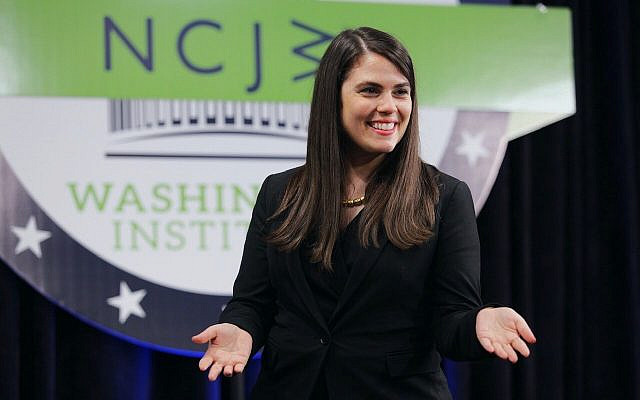
“We’re working to get people to polling locations that have a particular level of expertise and training to be able to advise people on their rights,” she said. “Lawyers are definitely highly preferred as people we want on the ground. But we have training that will be available to any person who wants to make sure that they’re available to be able to let people know what their rights are.”
Lawyers for the Anti-Defamation League have joined an effort led by Common Cause in Texas to overturn an order by Gov. Greg Abbott to limit ballot drops to one station per county. “Limiting the number of drop-off sites available to absentee voters reduces the options Texans have to participate in the 2020 election without risking their health,” Cheryl Drazin, the vice president of ADL’s central division, said in a statement.
Encouraging Election Day volunteering
The Lippman Kanfer Foundation for Living Torah is encouraging Jewish organizations to let staffers take Election Day off to volunteer as poll workers, and is providing training for deescalation should they encounter attempts to disrupt voting. It launched its program, called Free and Fair: Our Duty to Democracy, on Tuesday.
Aaron Dorfman, the foundation’s president, said it was working with Over Zero, a group that combats “identity-based violence.” The training involves connecting volunteers from faith communities and establishing lines of communication if there is a threat, which is increasingly understood as a potential outcome during this election.
“If there are instances of violence on around Election Day they’re prepared to connect with local law enforcement of elected officials and other faith leaders,” he said. “They can think and strategize together and respond collectively.”
The ADL has published a guide for state and local officials to identify possible sources of extremist violence ahead of time. “It’s a toolkit or reference for state and local officials who are confronting the challenge of the potential for threats motivated by extremism,” said Steve Freeman, the ADL’s vice president for civil rights.
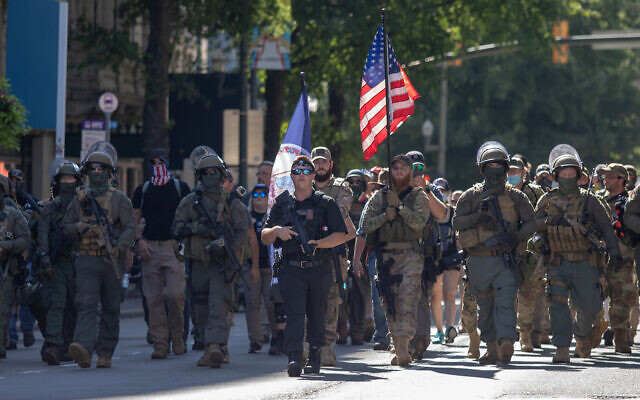
Sending wish-you-were-voting postcards
The Jewish federation in Buffalo, New York, is getting volunteers to write postcards to the voters in the states designated by the Reclaim our Vote project, which cites studies that have found that handwritten appeals on the back of colorful postcards spur 25 percent of recipients to reregister.
“Every county has specific texts that you’re allowed to use and they handwrite postcards, and they’re given an address to send,” said Mara Koven-Gelman, the federation’s community relations director.
Deborah Cohen, a retired psychiatric nurse who is a congregant at Buffalo’s Congregation Shir Shalom, initiated the postcard writing, drawing in 50 of her fellow congregants. Koven-Gelman said the effort has spread throughout the community and has reached “students and grandparents, people trying to make a difference.”
Addressing challenges facing the young and old
Hillel, the international organization that works with college students and young adults, has revamped its MitzVote campaign for the pandemic era, launching a website that helps students homebound by the pandemic figure out how and where to register to vote.
Two years ago, “West Wing” star and Jewish Twitter celebrity Josh Malina starred in a MitzVote get-out-the-vote video. This year, he’s joined by several other prominent (but youth-oriented) Jews in promoting MitzVote’s “Schmear Campaign,” which aims to convince college-aged voters that casting a ballot during the pandemic is as easy as toasting a bagel.
Announcing Hillel’s #MitzVote schmear campaign, spread the news (and that cream cheese of course!)



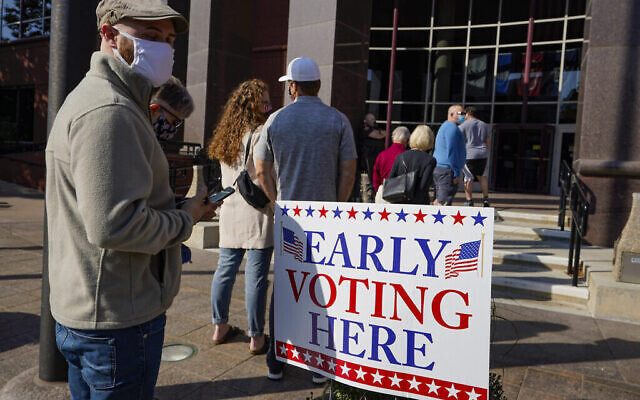
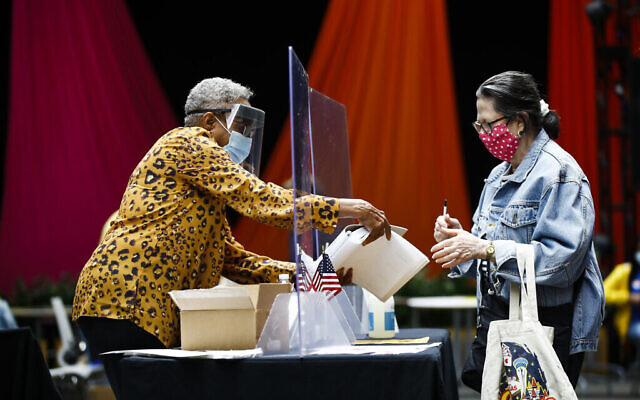
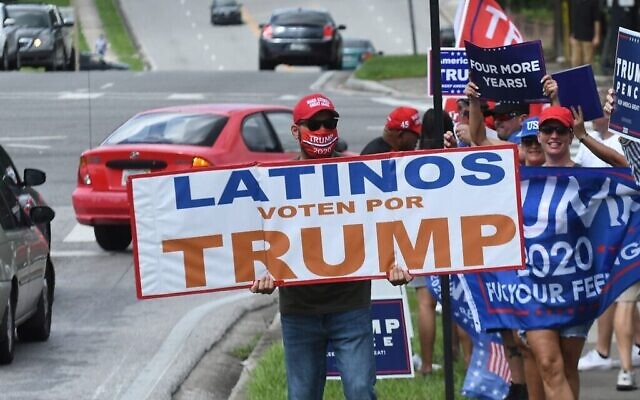
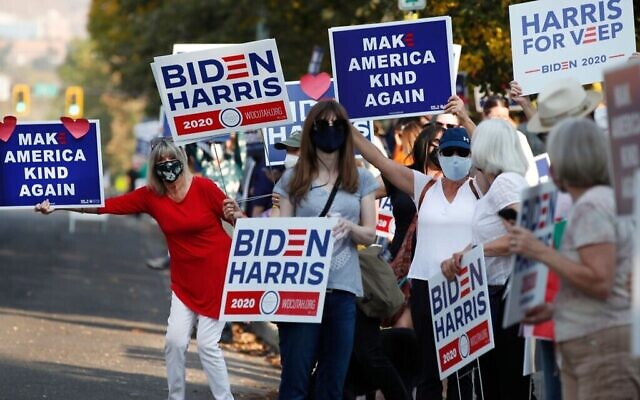
comments